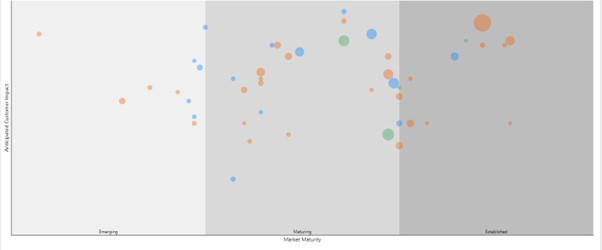My team (the Office of the CTO) within our UK business is a group of customer focussed Technologists whose sole aim is to ensure we continue to be relevant to our customers and partners. One of our key opportunities is to share knowledge more effectively, but as with most organisations this can be challenging.
We have been looking at how we can share and leverage this knowledge much more effectively as a central pillar of our growth strategy. Involving both cultural and process changes, delivering on this aim can help us to support our business and our customers better.
The many questions we want to be able to answer in a more coherent and objective manner, include:
- What are we seeing specific market segment that could be relevant to adjacent industries?
- Which organisations or industries re following similar paths in transformation where we could share experiences?
- What trends do we see emerging where we should accelerate our investment and focus?
We have tried previously to capture this information, but lacked the specific clarity we are looking to achieve. Often we get drawn to anecdotes and sentiments rather than stepping back and really understanding the wider perspective. We knew that deeper insights were possible, we just needed to find new ways to unlock them.
The emergence of tools like Microsoft’s PowerBI has been a huge benefit to us in quickly creating visualisations of data and iterating them as further opportunities became apparent. The ability to ‘see’ the data we were capturing and the effect of compounding or joining up different data points has allowed us to rapidly move to a dataset that is now significantly more impactful.
We made a team decision that the capture and sharing of information and insight is the lynchpin of our future success. No more storing files in private folder systems; making conscious efforts to share insights from conversations, celebrating success stories and reflecting on challenging situations. Our efforts have been focussed on the tooling and cultural aspects of realising this vision.
We agreed a need to transition from subjective to objective. Anecdotes need substantiating, opinions are better when validated and shared. What we are seeing, hearing and sensing needed to be channelled better, creating a more robust approach to deliver direction and impactful outcomes to all our stakeholders.
This spawned a “vision” of how we could leverage data to drive the effectiveness of our team. We centred on 4 key questions :
- What is useful for us to capture?
- How could we exploit the data better?
- What would make it valuable to the team members?
- How do we make it easy?
I mentioned culture earlier, you will notice that we have focussed on the user aspects (“What’s in it for me?”) as much as the data and process itself. This is critical in breaking down resistance to change and securing adoption to realise the value. With this considered we started to think about an actual tool and set of processes that would not only let us capture information, but enable us to do something effective with it.
This is where we leveraged “low code” technology to rapidly build a platform that supported our needs, without the overhead, cost and complexity of an “off the shelf” software platform. We were able to quickly build a central repository for key data, with a supporting engine of workflows and processes that integrate seamlessly to our existing tools.
What we have done is deliver new valuable business information, with only the smallest changes to current working practices. We now have much clearer visibility of the priority conversations and focus areas of where our customers need our help today, and where we need to get to in the future. And we’ll use this information to drive our future customer engagement, thought leadership and accelerate and improve our offering developments.
What do I actually mean by this? Consider the below picture. I’ve redacted some of the information, but if you understand that each circle is a topic (a trend or solution in our market), and the size and colour of the bubble reflects its relevance to us based on its prevalence in our engagements. This view tells us “what’s hot and what’s not”, and enables us to make more informed decisions based in data about how we use our resources to respond to these market requirements. And the information provides huge insight and benefit to our customers which enables us to be a far more effective partner to them in driving technology transformation.
 This is just the start of our data driven journey. Our efforts so far have only gone to validate what is said elsewhere that the value and opportunity of data is limitless. Over time, as the data grows, it will become much more the basis for the decisions that we make.
This is just the start of our data driven journey. Our efforts so far have only gone to validate what is said elsewhere that the value and opportunity of data is limitless. Over time, as the data grows, it will become much more the basis for the decisions that we make.